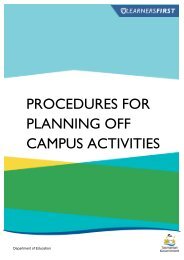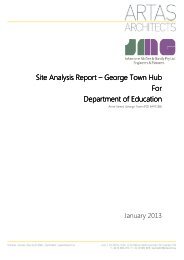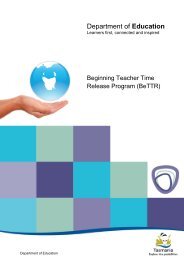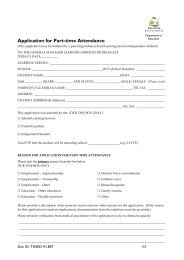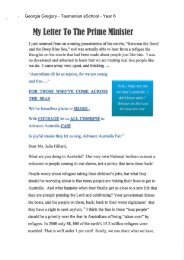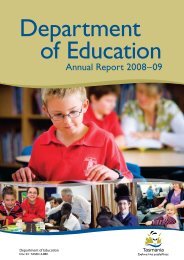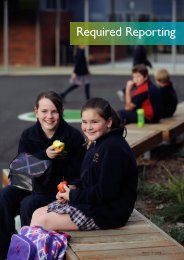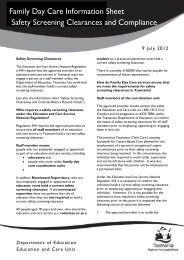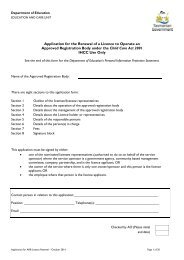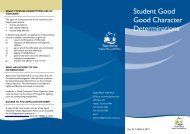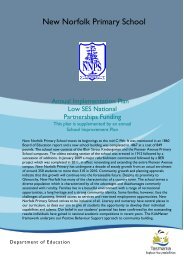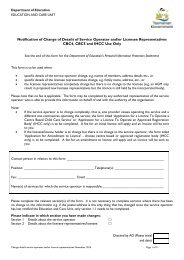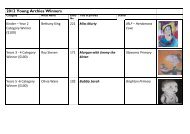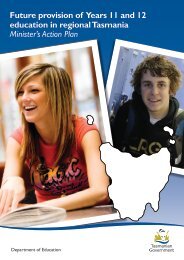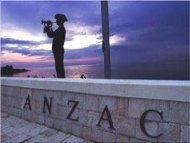Department of Education
DoE Annual Report 2010-2011 - Department of Education
DoE Annual Report 2010-2011 - Department of Education
- No tags were found...
Create successful ePaper yourself
Turn your PDF publications into a flip-book with our unique Google optimized e-Paper software.
Raising the Bar<br />
Closing the Gap<br />
(RTBCTG)<br />
The Raising the Bar Closing the Gap (RTBCTG) initiative aims to raise the bar on key measures <strong>of</strong> student<br />
literacy and numeracy and also close the gap between high and low achievers. The government initially<br />
committed $32 million over four years (2008–11) for the RTBCTG primary school initiative. The initiative<br />
will continue to be implemented from 2012. Additional funding <strong>of</strong> $9.975 million over four years enabled<br />
the successful strategy to be implemented into 13 government secondary schools from February 2011.<br />
The RTBCTG Indigenous extension initiative is funded at $1.9 million for two years under the Australian<br />
Government’s Expansion <strong>of</strong> literacy and numeracy programs for underachieving Indigenous students.<br />
Smarter Schools<br />
National<br />
Partnerships<br />
The three Tasmanian schooling sectors (government, Catholic, and independent) have developed one Bilateral<br />
Agreement and Final Implementation Plan, which addresses all three Smarter Schools National Partnerships:<br />
• Low Socioeconomic Status (SES) School Communities National Partnership<br />
• Literacy and Numeracy National Partnership<br />
• Improving Teacher Quality National Partnership<br />
Tasmania has adopted a multi-strategy approach to addressing the COAG reforms with a Low SES emphasis<br />
interwoven with both the Literacy and Numeracy and Improving Teacher Quality National Partnership (NP)<br />
initiatives. The strategies are to:<br />
• prioritise support for low SES communities and students achieving at or below National Minimum Standard<br />
in NAPLAN assessment, especially Indigenous and disadvantaged students<br />
• focus intervention and provide explicit support for students at transition points – Years 6–7 and Years 10–11<br />
• recognise that teaching is central to school improvement and student achievement and build capability in a<br />
way that will be sustainable; beyond the life <strong>of</strong> the National Partnership funding<br />
• develop the capacity <strong>of</strong> principals and teachers to effectively use student, school and system wide data to<br />
inform whole <strong>of</strong> school/network approaches to improve student learning outcomes<br />
• encourage schools to combine together as networks working, in partnership, with their extended school<br />
communities to support students and their families in a holistic way.<br />
Literacy<br />
Grants<br />
Funding <strong>of</strong> $2.5 million has been provided during 2010–11 to support literacy intervention for high Economic<br />
Needs Index (ENI) schools.<br />
Reading<br />
Recovery<br />
Reading Recovery is an early literacy intervention that provides specialist one to one teaching for students who<br />
have made slow progress learning to read and write after their first compulsory year <strong>of</strong> school. Funding <strong>of</strong><br />
$608,159 has been provided during 2010–11 to continue this program.<br />
Flying Start<br />
Funding <strong>of</strong> $10.7 million was provided during 2010–11 for all schools to access the Flying Start program which<br />
focuses on early intervention in literacy, numeracy and social skills from Kindergarten to Year 2.<br />
Early Years<br />
Literacy<br />
Funding <strong>of</strong> $220,000 was provided during 2010–11 to improve learning opportunities for young people<br />
through the provision <strong>of</strong> books for parents to read to their children.<br />
Premier's<br />
Reading<br />
Challenge<br />
The Premier’s Reading Challenge aims to improve the literacy <strong>of</strong> Tasmanian students, help raise awareness<br />
<strong>of</strong> the importance <strong>of</strong> reading amongst parents and the wider community and give young students a love <strong>of</strong><br />
reading to set <strong>of</strong> them up with one <strong>of</strong> life’s most precious skills. The Challenge has been operating successfully<br />
for the last five years.<br />
Contribution towards the benchmark<br />
Increasing students’ performance in literacy and numeracy is a key focus for the government and is reflected<br />
in the <strong>Department</strong> <strong>of</strong> <strong>Education</strong>’s Learner at the Centre 2009–11 strategy.<br />
Tasmania’s 2011 NAPLAN results for all year levels in Reading, Language Conventions and Numeracy were<br />
comparable with its 2010 results, and over the longer-term, 2008 results.<br />
Due to the change in the Writing genre in testing for 2011, a new Persuasive Writing scale has been<br />
established by ACARA. This new scale is not comparable with the previous Narrative Writing scale.<br />
Appendices – Tasmania Together Activity Report – Goal 3<br />
137



